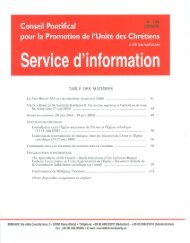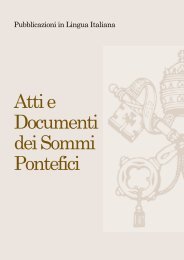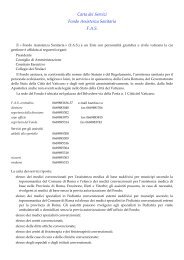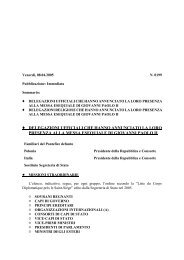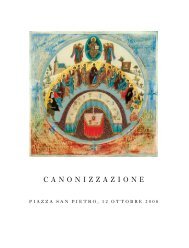Attention! Your ePaper is waiting for publication!
By publishing your document, the content will be optimally indexed by Google via AI and sorted into the right category for over 500 million ePaper readers on YUMPU.
This will ensure high visibility and many readers!

Your ePaper is now published and live on YUMPU!
You can find your publication here:
Share your interactive ePaper on all platforms and on your website with our embed function

AAS 80 - La Santa Sede
AAS 80 - La Santa Sede
AAS 80 - La Santa Sede
You also want an ePaper? Increase the reach of your titles
YUMPU automatically turns print PDFs into web optimized ePapers that Google loves.
Acta Ioannis Pauli Pp. II 1229<br />
parents, teachers, priests, Religious and all those who are in volved<br />
in the running of Catholic schools should keep informed about develop-<br />
ments in civil législation. I commend the many initiatives that have<br />
been taken in this regard, especially by your diocesan schools com<br />
missions. The commitment to continuing formation should not be<br />
limited to the study and application of developments common to all<br />
schools. It must also include the study and application of what is<br />
distinctively Catholic in the Church's educational endeavours. In a<br />
pluralistic society, Catholic institutions must strive to make a con<br />
tribution that is clearly and recognizably Catholic.<br />
In order to play their cruciai role in fulfìlling these goals Catholic<br />
teachers need their Bishops' support and encouragement, and not only<br />
to improve their professional knowledge and skills. A relationship<br />
must be fostered which promotes the teachers' understanding of<br />
Catholic éducation, ensures their appropriate pastoral care, and perfects<br />
their knowledge of the faith. Training is essential, and in this the<br />
Colleges of Education have a very important part to play to the extent<br />
that it is not only teachers whom they are forming but specifìcally<br />
Catholic teachers. It is also important to find ways of completing<br />
the formation of those who come from the universities, so that they<br />
may be truly Catholic teachers. I also encourage you to promote<br />
the vocation of Catholic teachers, and to recommend it to young people<br />
in the important years when they are considering and choosing a career.<br />
5. Catholic schools should be excellent in every way, not only in<br />
the curriculum of regular studies and in the network of relationships<br />
that constitute them, but above ail as communities of faith. Religious<br />
éducation is more than just one subject in the curriculum. In Catholic<br />
schools it is the core of the "core curriculum". Nor can religious<br />
éducation be allowed to become only a superficial veneer. For as the<br />
Council reminds us, the aim of Catholic schools is "to create an<br />
atmosphère... enlivened by the gospel spirit of freedom and charity;<br />
to enable young people, while developing their own personalities, to<br />
grow at the same time as the new créatures they have become by<br />
Baptism; and... to so orient the whole of human culture to the<br />
message of salvation that the knowledge which students acquire of<br />
the world, of life and of mankind is illumined by faith". 5 These aims<br />
can only be realized by a living witness to the Catholic faith on the<br />
5 Cf. Gravissimum Educationis, 8.
1228 Acta Apostolicae Sedis - Commentarium Officiale not only survive but flourish, in accordance with ali the principies of Catholic éducation described by the Council and enshrined in the history of Catholic éducation in Britain. 3. The challenges today are many, and they require co-operation both within society and within the Church for the sake of the common good. Catholic schools in particular are affected by the changing circumstances that have an impact on both human and ñnancial resources. At this period of Catholic éducation in your country, your local Churches are engaged in a reorganization that entails some closures, mergers and transfers. It is understandable that parents become anxious for their children, and teachers become anxious for their jobs and future prospects. It is therefore essential that Bishops give proper leadership in this phase of reorganization in order to secure a Catholic éducation for as many of the Church's young members as possible, and in order to ensure justice and wisdom in the location and allocation of schools and of teaching appointments within them. Everyone in vol ved in the provision and management of Catholic schools is required to cooperate under the leadership of the Bishops so that thèse schools may fulfil their mission both now and in the future. For some people this will mean the sacrifice of personal préférence in favour of the common good. When difiicult décisions must be made with regard to human and material resources, it is also necessary to keep in mind the words of Gravissimum Educationis: "Pastors of the Church and all the faithful are earnestly entreated to spare no sacrifice ... in showing special concern for the needs of those who are poor in the goods of this world, or who are strangers to the gift of faith". 4 This special concern is fundamental to the Church's fìrm commitment to promote a more just society. It is also fundamental to her mission of evangelization. 4. Bishops exercise their leadership not only by ensuring the pro vision of an adequate number of schools and their proper distribution, but also by promoting an understanding of the nature and importance of thèse schools. They must also safeguard their Catholic character, as well as promote and supervise the specifically religious teaching which is carried out in them. The satisfactory progress of Catholic schools also requires that 4 No. 9.
Acta Ioannis Pauli Pp. II 1229 parents, teachers, priests, Religious and all those who are in volved in the running of Catholic schools should keep informed about develop- ments in civil législation. I commend the many initiatives that have been taken in this regard, especially by your diocesan schools com missions. The commitment to continuing formation should not be limited to the study and application of developments common to all schools. It must also include the study and application of what is distinctively Catholic in the Church's educational endeavours. In a pluralistic society, Catholic institutions must strive to make a con tribution that is clearly and recognizably Catholic. In order to play their cruciai role in fulfìlling these goals Catholic teachers need their Bishops' support and encouragement, and not only to improve their professional knowledge and skills. A relationship must be fostered which promotes the teachers' understanding of Catholic éducation, ensures their appropriate pastoral care, and perfects their knowledge of the faith. Training is essential, and in this the Colleges of Education have a very important part to play to the extent that it is not only teachers whom they are forming but specifìcally Catholic teachers. It is also important to find ways of completing the formation of those who come from the universities, so that they may be truly Catholic teachers. I also encourage you to promote the vocation of Catholic teachers, and to recommend it to young people in the important years when they are considering and choosing a career. 5. Catholic schools should be excellent in every way, not only in the curriculum of regular studies and in the network of relationships that constitute them, but above ail as communities of faith. Religious éducation is more than just one subject in the curriculum. In Catholic schools it is the core of the "core curriculum". Nor can religious éducation be allowed to become only a superficial veneer. For as the Council reminds us, the aim of Catholic schools is "to create an atmosphère... enlivened by the gospel spirit of freedom and charity; to enable young people, while developing their own personalities, to grow at the same time as the new créatures they have become by Baptism; and... to so orient the whole of human culture to the message of salvation that the knowledge which students acquire of the world, of life and of mankind is illumined by faith". 5 These aims can only be realized by a living witness to the Catholic faith on the 5 Cf. Gravissimum Educationis, 8.
- Page 1:
ACTA APOSTOLICAE SEDIS COMMENTARIUM
- Page 6 and 7:
6 Acta Apostolicae Sedis - Commenta
- Page 8 and 9:
8 Acta Apostolicae Sedis - Commenta
- Page 10 and 11:
10 Acta Apostolicae Sedis - Comment
- Page 12 and 13:
12 Acta Apostolicae Sedis - Comment
- Page 14 and 15:
14 Acta Apostolicae Sedis - Comment
- Page 16 and 17:
16 Acta Apostolicae Sedis - Comment
- Page 18 and 19:
18 Acta Apostolicae Sedis - Comment
- Page 20 and 21:
20 Acta Apostolicae Sedis - Comment
- Page 22 and 23:
22 Acta Apostolicae Sedis - Comment
- Page 24 and 25:
24 Acta Apostolicae Sedis - Comment
- Page 26 and 27:
26 Acta Apostolicae Sedis - Comment
- Page 28 and 29:
28 Acta Apostolicae Sedis - Comment
- Page 30 and 31:
30 Acta Apostolicae Sedis - Comment
- Page 32 and 33:
32 Acta Apostolicae Sedis - Comment
- Page 34 and 35:
34 Acta Apostolicae Sedis - Comment
- Page 36 and 37:
36 Acta Apostolicae Sedis - Comment
- Page 38 and 39:
38 Acta- Apostolicae Sedis - Commen
- Page 40 and 41:
40 Acta Apostolicae Sedis - Comment
- Page 42 and 43:
42 Acta Apostolicae Sedis - Comment
- Page 44 and 45:
44 Acta Apostolicae Sedis - Comment
- Page 46 and 47:
46 Acta Apostolicae Sedis - Comment
- Page 48 and 49:
48 Acta Apostolicae Sedis - Comment
- Page 50 and 51:
50 Acta Apostolicae Sedis - Comment
- Page 52 and 53:
52 Acta Apostolicae Sedis - Comment
- Page 54 and 55:
54 Acta Apostolicae Sedis - Comment
- Page 56 and 57:
56 Acta Apostolicae Sedis - Comment
- Page 58 and 59:
58 Acta Apostolicae Sedis - Comment
- Page 60 and 61:
60 Acta Apostolicae Sedis - Comment
- Page 62 and 63:
62 Acta Apostolicae Sedis - Comment
- Page 64 and 65:
64 Acta Apostolicae Sedis - Comment
- Page 66 and 67:
66 Acta Apostolicae Sedis - Comment
- Page 68 and 69:
68 Acta Apostolicae Sedis - Comment
- Page 70 and 71:
70 Acta Apostolicae Sedis - Comment
- Page 72 and 73:
72 Acta Apostolicae Sedis - Comment
- Page 74 and 75:
74 Acta Apostolicae Sedis - Comment
- Page 76 and 77:
76 Acta Apostolicae Sedis - Comment
- Page 78 and 79:
78 Acta Apostolicae Sedis - Comment
- Page 80 and 81:
80 Acta Apostolicae Sedis - Comment
- Page 82 and 83:
82 Acta Apostolicae Sedis - Comment
- Page 84 and 85:
84 Acta Apostolicae Sedis - Comment
- Page 86 and 87:
86 Acta Apostolicae Sedis - Comment
- Page 88 and 89:
88 Acta Apostolicae Sedis - Comment
- Page 90 and 91:
90 Acta Apostolicae Sedis - Comment
- Page 92 and 93:
92 Acta Apostolicae Sedis - Comment
- Page 94 and 95:
94 Acta Apostolicae Sedis - Comment
- Page 96 and 97:
96 Acta Apostolicae Sedis - Comment
- Page 98 and 99:
98 Acta Apostolicae Sedis - Comment
- Page 100 and 101:
100 Acta Apostolicae Sedis - Commen
- Page 102 and 103:
102 Acta Apostolicae Sedis - Commen
- Page 104 and 105:
104 Acta Apostolicae Sedis - Commen
- Page 106 and 107:
106 Acta Apostolicae Sedis - Commen
- Page 108 and 109:
108 Acta Apostolicae Sedis - Commen
- Page 110 and 111:
110 Acta Apostolicae Sedis - Commen
- Page 112 and 113:
112 Acta Apostolicae Sedis - Commen
- Page 114 and 115:
114 Acta Apostolicae Sedis - Commen
- Page 116 and 117:
116 Acta Apostolicae Sedis - Commen
- Page 118 and 119:
118 Acta Apostolicae Sedis - Commen
- Page 120 and 121:
120 Acta Apostolicae Sedis - Commen
- Page 122 and 123:
122 Acta Apostolicae Sedis - Commen
- Page 124 and 125:
124 Acta Apostolicae Sedis - Commen
- Page 126 and 127:
126 Acta Apostolicae Sedis - Commen
- Page 128 and 129:
128 Acta Apostolicae Sedis - Commen
- Page 130 and 131:
130 Acta Apostolicae Sedis - Commen
- Page 132 and 133:
132 Acta Apostolicae Sedis - Commen
- Page 134 and 135:
134 Acta Apostolicae Sedis - Commen
- Page 136 and 137:
136 Acta Apostolicae Sedis - Commen
- Page 138 and 139:
138 Acta Apostolicae Sedis - Commen
- Page 140 and 141:
140 Acta Apostolicae Sedis - Commen
- Page 142 and 143:
142 Acta Apostolicae Sedis - Commen
- Page 144 and 145:
144 Acta Apostolicae Sedis - Commen
- Page 146 and 147:
146 Acta Apostolicae Sedis - Commen
- Page 148 and 149:
148 Acta Apostolicae Sedis - Commen
- Page 150 and 151:
150 Acta Apostolicae Sedis - Commen
- Page 152 and 153:
152 Acta Apostolicae Sedis - Commen
- Page 154 and 155:
154 Acta Apostolicae Sedis - Commen
- Page 156 and 157:
156 Acta Apostolicae Sedis - Commen
- Page 158 and 159:
158 Acta Apostolicae Sedis - Commen
- Page 160 and 161:
160 Acta Apostolicae Sedis - Commen
- Page 162 and 163:
162 Acta Apostolicae Sedis - Commen
- Page 164 and 165:
164 Acta Apostolicae Sedis - Commen
- Page 166 and 167:
166 Acta Apostolicae Sedis - Commen
- Page 168 and 169:
168 Acta Apostolicae Sedis - Commen
- Page 170 and 171:
170 Acta Apostolicae Sedis - Commen
- Page 172 and 173:
172 Acta Apostolicae Sedis - Commen
- Page 174 and 175:
174 Acta Apostolicae Sedis - Commen
- Page 176 and 177:
176 Acta Apostolicae Sedis - Commen
- Page 178 and 179:
178 Acta Apostolicae Sedis - Commen
- Page 180 and 181:
180 Acta Apostolicae Sedis - Commen
- Page 182 and 183:
182 Acta Apostolicae Sedis - Commen
- Page 184 and 185:
184 Acta Apostolicae Sedis - Commen
- Page 186 and 187:
186 Acta Apostolicae Sedis - Commen
- Page 188 and 189:
188 Acta Apostolicae Sedis - Commen
- Page 190 and 191:
190 Acta Apostolicae Sedis - Commen
- Page 192 and 193:
192 Acta Apostolicae Sedis - Commen
- Page 194 and 195:
194 Acta Apostolicae Sedis - Commen
- Page 196 and 197:
196 Acta Apostolicae Sedis - Commen
- Page 198 and 199:
198 Acta Apostolicae Sedis - Commen
- Page 200 and 201:
200 Acta Apostolicae Sedis - Commen
- Page 202 and 203:
202 Acta Ioannis Pauli Pp. II con s
- Page 204 and 205:
204 Acta Apostolicae Sedis - Commen
- Page 206 and 207:
206 Acta Apostolicae Sedis - Commen
- Page 208 and 209:
208 Acta, Apostolicae Sedis - Comme
- Page 210 and 211:
210 Acta Apostolicae Sedis - Commen
- Page 212 and 213:
212 Acta Apostolicae Sedis - Commen
- Page 214 and 215:
214 Acta Apostolicae Sedis - Commen
- Page 216 and 217:
216 Acta Apostolicae Sedis - Commen
- Page 218 and 219:
218 Acta Apostolicae Sedis - Commen
- Page 220 and 221:
220 Acta Apostolicae Sedis - Commen
- Page 222 and 223:
222 Acta Apostolicae Sedis - Commen
- Page 224 and 225:
224 Acta, Apostolicae Sedis - Comme
- Page 226 and 227:
226 Acta Apostolicae Sedis - Commen
- Page 228 and 229:
228 Acta Apostolicae Sedis - Commen
- Page 230 and 231:
230 Acta Apostolicae Sedis - Commen
- Page 232 and 233:
232 Acta Apostolicae Sedis - Commen
- Page 234 and 235:
234 Acta Apostolicae Sedis - Commen
- Page 236 and 237:
236 Acta Apostolicae Sedis - Commen
- Page 238 and 239:
238 Acta Apostolicae Sedis - Commen
- Page 240 and 241:
240 Acta Apostolicae Sedis - Commen
- Page 242 and 243:
242 Acta Apostolicae Sedis - Commen
- Page 244 and 245:
244 Acta Apostolicae Sedis - Commen
- Page 246 and 247:
246 Acta Apostolicae Sedis - Commen
- Page 248 and 249:
248 Acta Apostolicae Sedis - Commen
- Page 250 and 251:
250 Acta Apostolicae Sedis - Commen
- Page 252 and 253:
252 Acta Apostolicae Sedis - Commen
- Page 254 and 255:
254 Acta Apostolicae Sedis - Commen
- Page 256 and 257:
256 Acta Apostolicae Sedis - Commen
- Page 258 and 259:
258 Acta Apostolicae Sedis - Commen
- Page 260 and 261:
260 Acta Apostolicae Sedis - Commen
- Page 262 and 263:
262 Acta Apostolicae Sedis - Commen
- Page 264 and 265:
264 Acta Apostolicae Sedis - Commen
- Page 266 and 267:
266 Acta Apostolicae Sedis - Commen
- Page 268 and 269:
268 Acta Apostolicae Sedis - Commen
- Page 270 and 271:
270 Acta Apostolicae Sedis - Commen
- Page 272 and 273:
272 Acta Apostolicae Sedis - Commen
- Page 274 and 275:
274 Acta Apostolicae Sedis - Commen
- Page 276 and 277:
276 Acta Apostolicae Sedis - Commen
- Page 278 and 279:
278 Acta Apostolicae Sedis - Commen
- Page 280 and 281:
280 Acta Apostolicae Sectis - Comme
- Page 282 and 283:
282 Acta Apostolicae Sedis - Commen
- Page 284 and 285:
284 Acta Apostolicae Sedis - Commen
- Page 286 and 287:
286 Acta Apostolicae Sedis - Commen
- Page 288 and 289:
288 Acta Apostolicae Sedis - Commen
- Page 290 and 291:
290 Acta Apostolicae Sedis - Commen
- Page 292 and 293:
292 Acta Apostolicae Sedis - Commen
- Page 294 and 295:
294 Acta Apostolicae Sedis - Commen
- Page 296 and 297:
296 Acta Apostolicae Sedis - Commen
- Page 298 and 299:
298 Acta Apostolicae Sedis - Commen
- Page 300 and 301:
300 Acta Apostolicae Sedis - Commen
- Page 302 and 303:
302 Acta Apostolicae Sedis - Commen
- Page 304 and 305:
304 Acta Apostolicae Sedis - Commen
- Page 306 and 307:
306 Acta Apostolicae Sedis - Commen
- Page 308 and 309:
308 Acta Apostolicae Sedis - Commen
- Page 310 and 311:
310 Acta Apostolicae Sedis - Commen
- Page 312 and 313:
312 Acta Apostolicae Sedis - Commen
- Page 314 and 315:
314 Acta Apostolicae Sedis - Commen
- Page 316 and 317:
316 Acta Apostolicae Sedis - Commen
- Page 318 and 319:
318 Acta Apostolicae Sedis - Commen
- Page 320 and 321:
320 Acta Apostolicae Sedis - Commen
- Page 322 and 323:
322 Acta Apostolicae Sedis - Commen
- Page 324 and 325:
324 Acta Apostolicae Sedis - Commen
- Page 326 and 327:
326 Acta Apostolicae Sedis - Commen
- Page 328 and 329:
328 Acta Apostolicae Sedis - Commen
- Page 330 and 331:
330 Acta Apostolicae Sedis - Commen
- Page 332 and 333:
332 Acta Apostolicae Sedis - Commen
- Page 334 and 335:
334 Acta Apostolicae Sedis - Commen
- Page 336 and 337:
336 Acta Apostolicae Sedis - Commen
- Page 338 and 339:
338 Acta Apostolicae Sedis - Commen
- Page 340 and 341:
340 Acta Apostolicae Sedis - Commen
- Page 342 and 343:
342 Acta Apostolicae Sedis - Commen
- Page 344 and 345:
344 Acta Apostolicae Sedis - Commen
- Page 346 and 347:
346 Acta Apostolicae Sedis - Commen
- Page 348 and 349:
348 Acta Apostolicae Sedis - Commen
- Page 350 and 351:
350 Acta Apostolicae Sedfs - Commen
- Page 352 and 353:
352 Acta Apostolicae Sedis - Commen
- Page 354 and 355:
354 Acta Apostolicae Sedis - Commen
- Page 356 and 357:
356 Acta Apostolicae Sedis - Commen
- Page 358 and 359:
358 Acta Apostolicae Sedis - Commen
- Page 360 and 361:
360 Acta Apostolicae Sedis - Commen
- Page 362 and 363:
362 Acta Apostolicae Sedis - Commen
- Page 364 and 365:
364 Acta Apostolicae Sedis - Commen
- Page 366 and 367:
366 Acta Apostolicae Sedis - Commen
- Page 368 and 369:
368 Acta Apostolicae Sedis - Commen
- Page 370 and 371:
370 Acta Apostolicae Sedis - Commen
- Page 372 and 373:
372 Acta Apostolicae Sedis - Commen
- Page 374 and 375:
374 Acta Apostolicae Sedis - Commen
- Page 376 and 377:
376 Acta Apostolicae Sedis - Commen
- Page 378 and 379:
378 Acta Apostolicae Sedis - Commen
- Page 380 and 381:
380 Acta Apostolicae Sedis - Commen
- Page 382 and 383:
382 Acta Apostolicae Sedis - Commen
- Page 384 and 385:
384 Acta Apostolicae Sedis - Commen
- Page 386 and 387:
386 Acta Apostolicae Sedis - Commen
- Page 388 and 389:
388 Acta Apostolicae Sedis - Commen
- Page 390 and 391:
390 Acta Apostolicae Sedis - Commen
- Page 392 and 393:
392 Acta Apostolicae Sedis - Commen
- Page 394 and 395:
394 Acta Apostolicae Sedis - Commen
- Page 396 and 397:
396 Acta Apostolicae Sedis - Commen
- Page 398 and 399:
398 Acta Apostolicae Sedis - Commen
- Page 400 and 401:
400 Acta Apostolicae Sedis - Commen
- Page 402 and 403:
402 Acta Apostolicae Sedis - Commen
- Page 404 and 405:
404 Acta Apostolicae Sedis - Commen
- Page 406 and 407:
406 Acta Apostolicae Sedis - Commen
- Page 408 and 409:
408 Acta Apostolicae Sedis - Commen
- Page 410 and 411:
410 Acta Apostolicae Sedis - Commen
- Page 412 and 413:
412 Acta Apostolicae Sedis Commenta
- Page 414 and 415:
414 Acta Apostolicae Sedis - Commen
- Page 416 and 417:
416 Acta Apostolicae Sedis - Commen
- Page 418 and 419:
418 Acta Apostolicae Sedis - Commen
- Page 420 and 421:
420 Acta Apostolicae Sedis - Commen
- Page 422 and 423:
422 Acta Apostolicae. Sedis - Comme
- Page 424 and 425:
424 Acta Apostolicae Sedis - Commen
- Page 426 and 427:
426 Acta Apostolicae Sedis - Commen
- Page 428 and 429:
428 Acta Apostolicae Sedis - Commen
- Page 430 and 431:
430 Acta Apostolicae Sedis - Commen
- Page 432 and 433:
432 Acta Apostolicae Sedis - Commen
- Page 434 and 435:
434 Acta Apostolicae Sedis - Commen
- Page 436 and 437:
436 Acta Apostolicae Sedis - Commen
- Page 438 and 439:
438 Acta Apostolicae Sedis - Commen
- Page 440 and 441:
440 Acta Apostolicae Sedis - Commen
- Page 442 and 443:
442 Acta Apostolicae Sedis - Commen
- Page 444 and 445:
444 Acta Apostolicae Sedis - Commen
- Page 446 and 447:
446 Acta Apostolicae Sedis - Commen
- Page 448 and 449:
448 Acta Apostolicae Sedis - Commen
- Page 450 and 451:
450 Acta Apostolicae Sedis - Commen
- Page 452 and 453:
452 Acta Apostolicae Sedis - Commen
- Page 454 and 455:
454 Acta Apostolicae Sedis - Commen
- Page 456 and 457:
456 Acta Apostolicae Sedis - Commen
- Page 458 and 459:
458 Acta Apostolicae Sedis - Commen
- Page 460 and 461:
460 Acta Apostolicae Sedis - Commen
- Page 462 and 463:
462 Acta Apostolicae Sedis - Commen
- Page 464 and 465:
464 Acta Apostolicae Sedis - Commen
- Page 466 and 467:
466 Acta Apostolicae Sedis - Commen
- Page 468 and 469:
468 Acta Apostolicae Sedis - Commen
- Page 470 and 471:
470 Acta Apostolicae Sedis - Commen
- Page 472 and 473:
472 Acta Apostolicae Sedis - Commen
- Page 474 and 475:
474 Acta Apostolicae Sedis - Commen
- Page 476 and 477:
476 Acta Apostolicae Sedis - Commen
- Page 478 and 479:
478 Acta Apostolicae Sedis - Commen
- Page 480 and 481:
480 Acta Apostolicae Sedis - Commen
- Page 482 and 483:
482 Acta Apostolicae Sedis - Commen
- Page 484 and 485:
484 Acta Apostolicae Sedis - Commen
- Page 486 and 487:
486 Acta Apostolicae Sedis - Commen
- Page 488 and 489:
488 Acta Apostolicae Sedis - Commen
- Page 490 and 491:
490 Acta Apostolicae Sedis - Commen
- Page 492 and 493:
492 Acta Apostolicae Sedis - Commen
- Page 494 and 495:
494 Acta Apostolicae Sedis - Commen
- Page 496 and 497:
496 Acta Apostolicae Sedis - Commen
- Page 498 and 499:
498 Acta Apostolicae Sedis - Commen
- Page 500 and 501:
500 Acta Apostolicae Sedis - Commen
- Page 502 and 503:
502 Acta Apostolicae Sedis - Commen
- Page 504 and 505:
504 Acta Apostolicae Sedis - Commen
- Page 506 and 507:
506 Acta Apostolicae Sedis - Commen
- Page 508 and 509:
508 Acta Apostolicae Sedis - Commen
- Page 510 and 511:
510 Acta Apostolicae Sedis - Commen
- Page 512 and 513:
512 Acta Apostolicae Sedis - Commen
- Page 514 and 515:
514 Acta Apostolicae Sedis - Commen
- Page 516 and 517:
516 Acta Apostolicae Sedis - Commen
- Page 518 and 519:
518 Acta Apostolicae Sedis - Commen
- Page 520 and 521:
520 Acta Apostolicae Sedis - Commen
- Page 522 and 523:
522 Acta Apostolicae Sedis - Commen
- Page 524 and 525:
524 Acta Apostolicae Sedis - Commen
- Page 526 and 527:
526 Acta Apostolicae Sedis - Commen
- Page 528 and 529:
528 Acta Apostolicae Sedis - Commen
- Page 530 and 531:
530 Acta Apostolicae Sedis - Commen
- Page 532 and 533:
532 Acta Apostolicae Sedis - Commen
- Page 534 and 535:
534 Acta Apostolicae Sedis - Commen
- Page 536 and 537:
S36 Acta Apostolicae Sedis - Commen
- Page 538 and 539:
538 Acta Apostolicae Sedis - Commen
- Page 540 and 541:
540 Acta Apostolicae Sedis - Commen
- Page 542 and 543:
542 Acta Apostolicae Sedis - Commen
- Page 544 and 545:
544 Acta Apostolicae Sedis - Commen
- Page 546 and 547:
546 Acta Apostolicae Sedis - Commen
- Page 548 and 549:
548 Acta Apostolicae Sedis - Commen
- Page 550 and 551:
550 Acta Apostolicae Sedis - Commen
- Page 552 and 553:
552 Acta Apostolicae Sedis - Commen
- Page 554 and 555:
554 Acta Apostolicae Sedis - Commen
- Page 556 and 557:
556 Acta Apostolicae Sedis - Commen
- Page 558 and 559:
558 Acta Apostolicae Sedis - Commen
- Page 560 and 561:
560 Acta Apostolicae Sedis - Commen
- Page 562 and 563:
562 Acta Apostolicae Sedis - Commen
- Page 564 and 565:
564 Acta Apostolicae Sedis - Commen
- Page 566 and 567:
566 Acta Apostolicae Sedis - Commen
- Page 568 and 569:
568 Acta Apostolicae Sedis - Commen
- Page 570 and 571:
570 Acta Apostolicae Sedis - Commen
- Page 572 and 573:
572 Acta Apostolicae Sedis - Commen
- Page 574 and 575:
574 Acta Apostolicae Sedis - Commen
- Page 576 and 577:
576 Acta Apostolicae Sedis - Commen
- Page 578 and 579:
578 Acta Apostolicae Sedis - Commen
- Page 580 and 581:
580 Acta Apostolicae Sedis - Commen
- Page 582 and 583:
582 Acta Apostolicae Sedis - Commen
- Page 584 and 585:
584: Acta Apostolicae Sedis - Comme
- Page 586 and 587:
586 Acta Apostolicae Sedis - Commen
- Page 588 and 589:
588 Acta Apostolicae Sedis - Commen
- Page 590 and 591:
590 Acta Apostolicae Sedis - Commen
- Page 592 and 593:
592 Acta Apostolicae Sedis - Commen
- Page 594 and 595:
594 Acta Apostolicae Sedis - Commen
- Page 596 and 597:
696 Acta Apostolicae Sedis - Commen
- Page 598 and 599:
598 Acta Apostolicae Sedis - Commen
- Page 600 and 601:
600 Acta Apostolicae Sedis - Commen
- Page 602 and 603:
602 Acta Apostolicae Sedis - Commen
- Page 604 and 605:
604 Acta Apostolicae Sedis - Commen
- Page 606 and 607:
606 Acta Apostolicae Sedis - Commen
- Page 608 and 609:
608 Acta Apostolicae Sedis - Commen
- Page 610 and 611:
610 Acta Apostolicae Sedis - Commen
- Page 612 and 613:
612 Acta Apostolicae Sedis - Commen
- Page 614 and 615:
614 Acta Apostolicae Sedis - Commen
- Page 616 and 617:
616 Acta Apostolicae Sedis - Commen
- Page 618 and 619:
618 Acta Apostolicae Sedis - Commen
- Page 620 and 621:
620. Acta Apostolicae Sedis - Comme
- Page 622 and 623:
622 Acta Apostolicae Sedis - Commen
- Page 624 and 625:
624 Acta Apostolicae Sedis - Commen
- Page 626 and 627:
626 Acta Apostolicae Sedis - Commen
- Page 628 and 629:
628 Acta Apostolicae Sedis - Commen
- Page 630 and 631:
630 Acta Apostolicae Sedis - Commen
- Page 632 and 633:
632 Acta Apostolicae Sedis - Commen
- Page 634 and 635:
634 Acta Apostolicae Sedis - Commen
- Page 636 and 637:
636 Acta Apostolicae Sedis - Commen
- Page 638 and 639:
638 Acta Apostolicae Sedis - Commen
- Page 640 and 641:
640 Acta Apostolicae Sedis - Commen
- Page 642 and 643:
642 Acta Apostolicae Sedis - Commen
- Page 644 and 645:
644 Acta Apostolicae Sedis - Commen
- Page 646 and 647:
646 Acta Apostolicae Sedis - Commen
- Page 648 and 649:
648 Acta Apostolicae Sedis - Commen
- Page 650 and 651:
6Ö0 Acta Apostolicae Sedis - Comme
- Page 652 and 653:
652 Acta Apostolicae Sedis - Commen
- Page 654 and 655:
654 Acta Apostolicae Sedis - Commen
- Page 656 and 657:
656 Acta Apostolicae Sedis - Commen
- Page 658 and 659:
658 Acta Apostolicae Sedis - Commen
- Page 660 and 661:
660 Acta Apostolicae Sedis - Commen
- Page 662 and 663:
662 Acta Apostolicae Sedis - Commen
- Page 664 and 665:
664 Acta Apostolicae Sedis - Commen
- Page 666 and 667:
666 Acta Apostolicae Sedis - Commen
- Page 668 and 669:
668 Acta Apostolicae Sedis - Commen
- Page 670 and 671:
670 Acta Apostolicae Sedis - Commen
- Page 672 and 673:
672 Acta Apostolicae Sedis - Commen
- Page 674 and 675:
674 Acta Apostolicae Sedis - Commen
- Page 676 and 677:
676 Acta Apostolicae Sedis - Commen
- Page 678 and 679:
678 Acta Apostolicae Sedis - Commen
- Page 680 and 681:
680 Acta Apostolicae Sedis - Commen
- Page 682 and 683:
682 Acta Apostolicae Sedis - Commen
- Page 684 and 685:
684 Acta Apostolicae Sedis - Commen
- Page 686 and 687:
686 Acta Apostolicae Sedis - Commen
- Page 688 and 689:
688 Acta Apostolicae Sedis - Commen
- Page 690 and 691:
690 Acta Apostolicae Sedis - Commen
- Page 692 and 693:
692 Acta Apostolicae Sedis Commenta
- Page 694 and 695:
694 Acta Apostolicae Sedis - Commen
- Page 696 and 697:
696 Acta Apostolicae Sedis - Commen
- Page 698 and 699:
698 Acta Apostolicae Sedis - Commen
- Page 700 and 701:
700 Acta Apostolicae Sedis - Commen
- Page 702 and 703:
702 Acta Apostolicae Sedis - Commen
- Page 704 and 705:
704 Acta Apostolicae Sedis - Commen
- Page 706 and 707:
706 Acta Apostolicae Sedis - Commen
- Page 708 and 709:
708 Acta Apostolicae Sedis - Commen
- Page 710 and 711:
710 Acta Apostolicae Sedis - Commen
- Page 712 and 713:
712 Acta Apostolicae Sedis - Commen
- Page 714 and 715:
714 Acta Apostolicae Sedis - Commen
- Page 716 and 717:
716 Acta Apostolicae Sedis - Commen
- Page 718 and 719:
718 Acta Apostolicae Sedis - Commen
- Page 720 and 721:
720 Acta Apostolicae Sedis - Commen
- Page 722 and 723:
722 Acta Apostolicae Sedis - Commen
- Page 724 and 725:
724 Acta Apostolicae Sedis - Commen
- Page 726 and 727:
726 Acta Apostolicae Sedis - Commen
- Page 728 and 729:
728 Acta Apostolicae Sedis - Commen
- Page 730 and 731:
730 Acta Apostolicae Sedis - Commen
- Page 732 and 733:
732 Acta Apostolicae Sedis - Commen
- Page 734 and 735:
734 Acta Apostolicae Sedis - Commen
- Page 736 and 737:
736 Acta Apostolicae Sedis - Commen
- Page 738 and 739:
738 Acta Apostolicae Sedis - Commen
- Page 740 and 741:
740 Acta Apostolicae Sedis - Commen
- Page 742 and 743:
742 Acta Apostolicae Sedis - Commen
- Page 744 and 745:
744 Acta Apostolicae Sedis - Commen
- Page 746 and 747:
746 Acta Apostolicae Sedis - Commen
- Page 748 and 749:
748 Acta Apostolicae Sedis - Commen
- Page 750 and 751:
750 Acta Apostolicae Sedis - Commen
- Page 752 and 753:
752 Acta Apostolicae Sedis - Commen
- Page 754 and 755:
754 Acta Apostolicae Sedis - Commen
- Page 756 and 757:
756 Acta Apostolicae Sedis - Commen
- Page 758 and 759:
758 Acta Apostolicae Sectis - Comme
- Page 760 and 761:
760 Acta Apostolicae Sedis - Commen
- Page 762 and 763:
762 Acta Apostolicae Sedis - Commen
- Page 764 and 765:
764 Acta Apostolicae Sedis - Commen
- Page 766 and 767:
766 Acta Apostolicae Sedis - Commen
- Page 768 and 769:
768 Acta Apostolicae Sedis - Commen
- Page 770 and 771:
770 Acta Apostolicae Sedis - Commen
- Page 772 and 773:
772 Acta Apostolicae Sedis - Commen
- Page 774 and 775:
774 Acta Apostolicae Sedis - Commen
- Page 776 and 777:
776 Acta Apostolicae Sedis - Commen
- Page 778 and 779:
778 Acta Apostolicae Sedis - Commen
- Page 780 and 781:
780 Acta Apostolicae Sedis - Commen
- Page 782 and 783:
782 Acta Apostolicae Sedis - Commen
- Page 784 and 785:
784 Acta Apostolicae Sedis - Commen
- Page 786 and 787:
786 Acta Apostolicae Sedis - Commen
- Page 788 and 789:
788 Acta Apostolicae Sedis - Commen
- Page 790 and 791:
790 Acta Apostolicae Sedis - Commen
- Page 792 and 793:
792 Acta Apostolicae Sedis - Commen
- Page 794 and 795:
794 Acta Apostolicae Sedis - Commen
- Page 796 and 797:
796 Acta Apostolicae Sedis - Commen
- Page 798 and 799:
798 Acta Apostolicae Sedis - Commen
- Page 800 and 801:
800 Acta Apostolicae Sedis - Commen
- Page 802 and 803:
802 Acta Apostolicae Sedis - Commen
- Page 804 and 805:
804 Acta Apostolicae Sedis - Commen
- Page 806 and 807:
806 Acta Apostolicae Sedis - Commen
- Page 808 and 809:
808 Acta Apostolicae Sedis - Commen
- Page 810 and 811:
810 Acta Apostolicae Sedis - Commen
- Page 812 and 813:
812 Acta Apostolicae Sedis - Commen
- Page 814 and 815:
814 Acta Apostolicae Sedis - Commen
- Page 816 and 817:
816 Acta Apostolicae Sedis - Commen
- Page 818 and 819:
818 Acta Apostolicae Sedis - Commen
- Page 820 and 821:
820 Acta Apostolicae Sedis - Commen
- Page 822 and 823:
822 Acta Apostolicae Sedis - Commen
- Page 824 and 825:
824 Acta Apostolicae Sedis - Commen
- Page 826 and 827:
826 Acta Apostolicae Sedis - Commen
- Page 828 and 829:
828 Acta Apostolicae Sedis - Commen
- Page 830 and 831:
830 Acta Apostolicae Sedis - Commen
- Page 832 and 833:
832 Acta Apostolicae Sedis - Commen
- Page 834 and 835:
834 Acta Apostolicae Sedis - Commen
- Page 836 and 837:
836 Acta Apostolicae Sedis - Commen
- Page 838 and 839:
838 Acta Apostolicae Sedis - Commen
- Page 840 and 841:
840 Acta Apostolicae Sedis - Commen
- Page 842 and 843:
842 Acta Apostolicae Sedis - Commen
- Page 844 and 845:
844 Acta Apostolicae Sedis - Commen
- Page 846 and 847:
846 Acta Apostolicae Sedis - Commen
- Page 848 and 849:
848 Acta Apostolicae Sedis - Commen
- Page 850 and 851:
850 Acta Apostolicae Sedis - Commen
- Page 852 and 853:
852 Acta Apostolicae Sedis - Commen
- Page 854 and 855:
854 Acta Apostolicae Sedis - Commen
- Page 856 and 857:
856 Acta Apostolicae Sedis - Commen
- Page 858 and 859:
858 Acta Apostolicae Sedis - Commen
- Page 860 and 861:
860 Acta Apostolicae Sedis - Commen
- Page 862 and 863:
862 Acta Apostolicae Sedis - Commen
- Page 864 and 865:
864 Acta Apostolicae Sedis - Commen
- Page 866 and 867:
866 Acta Apostolicae Sedis - Commen
- Page 868 and 869:
868 Acta Apostolicae Sedis - Commen
- Page 870 and 871:
870 Aota Apostolicae Sedia - Commen
- Page 872 and 873:
872 Acta Apostolicae Sedis - Commen
- Page 874 and 875:
874 Acta Apostolicae Sedis - Commen
- Page 876 and 877:
876 Acta Apostolicae Sedis - Commen
- Page 878 and 879:
878 Acta Apostolicae Sedis - Commen
- Page 880 and 881:
880 Acta- Apostolicae Sedis - Comme
- Page 882 and 883:
882 Acta Apostolicae Sedis - Commen
- Page 884 and 885:
884 Acta Apostolicae Sedis - Commen
- Page 886 and 887:
886 Acta Apostolicae Sedis - Commen
- Page 888 and 889:
888 Acta Apostolicae Sedis - Commen
- Page 890 and 891:
890 Acta Apostolicae Sedis - Commen
- Page 892 and 893:
892 Acta Apostolicae Sedis - Commen
- Page 894 and 895:
894 Acta Apostolicae Sedis - Commen
- Page 896 and 897:
896 Acta Apostolicae Sedis - Commen
- Page 898 and 899:
898 Acta Apostolicae Sedis - Commen
- Page 900 and 901:
900 Acta Apostolicae Sedis - Commen
- Page 902 and 903:
902 Acta Apostolicae Sedis - Commen
- Page 904 and 905:
904 Acta Apostolicae Sedis - Commen
- Page 906 and 907:
906 Acta Apostolicae Sedis - Commen
- Page 908 and 909:
908 Acta Apostolicae Sedis - Commen
- Page 910 and 911:
910 Acta Apostolicae Sedis - Commen
- Page 912 and 913:
912 Acta Apostolicae Sedis - Commen
- Page 914 and 915:
914 Acta Apostolicae Sedis - Commen
- Page 916 and 917:
916 Acta Apostolicae Sedis - Commen
- Page 918 and 919:
918 Acta Apostolicae Sedis - Commen
- Page 920 and 921:
920 Acta Apostolicae Sedis - Commen
- Page 922 and 923:
922 Acta Apostolicae Sedis - Commen
- Page 924 and 925:
924 Acta Apostolicae Sedis - Commen
- Page 926 and 927:
926 Acta Apostolicae Sedis - Commen
- Page 928 and 929:
928 Acta Apostolicae Sedis - Commen
- Page 930 and 931:
930 Acta Apostolicae Sedis •• C
- Page 932 and 933:
932 Acta Apostolicae Sedis - Commen
- Page 934 and 935:
934 Acta Apostolicae Sedis - Commen
- Page 936 and 937:
936 Acta Apostolicae Sedis - Commen
- Page 938 and 939:
938 Acta Apostolicae Sedis - Commen
- Page 940 and 941:
940 Acta Apostolicae Sedis - Commen
- Page 942 and 943:
942 Acta Apostolicae Sedis - Commen
- Page 944 and 945:
944 Acta Apostolicae Sedis - Commen
- Page 946 and 947:
946 Acta Apostolicae Sedis - Commen
- Page 948 and 949:
948 Acta Apostolicae Sedis - Commen
- Page 950 and 951:
950 Acta Apostolicae Sedis - Commen
- Page 952 and 953:
952 Acta Apostolicae Sedis - Commen
- Page 954 and 955:
954 Acta Apostolicae Sedis - Commen
- Page 956 and 957:
956 Acta Apostolicae Sedis - Commen
- Page 958 and 959:
958 Acta Apostolicae Sedis - Commen
- Page 960 and 961:
960 Acta Apostolicae Sedis - Commen
- Page 962 and 963:
962 Acta Apostolicae Sedis - Commen
- Page 964 and 965:
964 Acta Apostolicae Sedis - Commen
- Page 966 and 967:
966 Acta Apostolicae Sedis - Commen
- Page 968 and 969:
968 Acta Apostolicae Sedis - Commen
- Page 970 and 971:
970 Acta Apostolicae Sedis - Commen
- Page 972 and 973:
972 Acta Apostolicae Sedis - Commen
- Page 974 and 975:
974 Acta Apostolicae Sedis - Commen
- Page 976 and 977:
976 Acta Apostolicae Sedis - Commen
- Page 978 and 979:
978 Acta Apostolicae Sedis - Commen
- Page 980 and 981:
980 Acta Apostolicae Sedis - Commen
- Page 982 and 983:
982 Acta Apostolicae Sedis - Commen
- Page 984 and 985:
984 Acta Apostolicae Sedis - Commen
- Page 986 and 987:
986 Acta Apostolicae Sedis - Commen
- Page 988 and 989:
988 Acta Apostolicae Sedis - Commen
- Page 990 and 991:
990 Acta Apostolicae Sedis - Commen
- Page 992 and 993:
992 Acta Apostolicae Sedis - Commen
- Page 994 and 995:
994 Acta Apostolicae Sedis - Commen
- Page 996 and 997:
996 Acta Apostolicae Sedis - Commen
- Page 998 and 999:
998 Acta Apostolicae Sedis - Commen
- Page 1000 and 1001:
1000 Acta Apostolicae Sedis - Comme
- Page 1002 and 1003:
1002 Acta Apostolicae Sedis - Comme
- Page 1004 and 1005:
1004 Acta Apostolicae Sedis - Comme
- Page 1006 and 1007:
1006 Acta Apostolicae Sedis - Comme
- Page 1008 and 1009:
1008 Acta Apostolicae Sedis - Comme
- Page 1010 and 1011:
1010 Acta Apostolicae Sedis - Comme
- Page 1012 and 1013:
1012 Acta Apostolicae Sedis - Comme
- Page 1014 and 1015:
1014 Acta Apostolicae Sedis - Comme
- Page 1016 and 1017:
1016 Acta Apostolicae Sedis - Comme
- Page 1018 and 1019:
1018 Acta Apostolicae Sedis - Comme
- Page 1020 and 1021:
1020 Acta Apostolicae Sedis - Comme
- Page 1022 and 1023:
1022 Acta Apostolicae Sedis - Comme
- Page 1024 and 1025:
1024 Acta Apostolicae Sedis Comment
- Page 1026 and 1027:
1026 Acta Apostolicae Sedis - Comme
- Page 1028 and 1029:
1028 Acta Apostolicae Sedis - Comme
- Page 1030 and 1031:
1030 Acta Apostolicae Sedis - Comme
- Page 1032 and 1033:
1032 Acta Apostolicae Sedis - Comme
- Page 1034 and 1035:
1034 Acta Apostolicae Sedis - Comme
- Page 1036 and 1037:
1036 Acta Apostolicae Sedis - Comme
- Page 1038 and 1039:
1038 Acta Apostolicae Sedis - Comme
- Page 1040 and 1041:
1040 Acta Apostolicae Sedis - Comme
- Page 1042 and 1043:
1042 Acta Apostolicae Sedis - Comme
- Page 1044 and 1045:
1044 Acta Apostolicae Sedis - Comme
- Page 1046 and 1047:
1046 Acta Apostolicae Sedis - Comme
- Page 1048 and 1049:
1048 Acta Apostolicae Sedis - Comme
- Page 1050 and 1051:
1050 Acta Apostolicae Sedis - Comme
- Page 1052 and 1053:
1052 Acta Apostolicae Sedis - Comme
- Page 1054 and 1055:
1054 Acta Apostolicae Sedis - Comme
- Page 1056 and 1057:
1066 Acta Apostolicae Sedis - Comme
- Page 1058 and 1059:
1058 Acta Apostolicae Sedis - Comme
- Page 1060 and 1061:
1060 Acta Apostolicae Sedis - Comme
- Page 1062 and 1063:
1062 Acta Apostolicae Sedis - Comme
- Page 1064 and 1065:
1064 Acta Apostolicae Sedis - Comme
- Page 1066 and 1067:
1066 Acta Apostolicae Sedis - Comme
- Page 1068 and 1069:
1068 Acta Apostolicae Sedis - Comme
- Page 1070 and 1071:
1070 Acta Apostolicae Sedis - Comme
- Page 1072 and 1073:
1072 Acta Apostolicae Sedis - Comme
- Page 1074 and 1075:
1074 Acta Apostolicae Sedis - Comme
- Page 1076 and 1077:
1076 Acta Apostolicae Sedis - Comme
- Page 1078 and 1079:
1078 Acta Apostolicae Sedis - Comme
- Page 1080 and 1081:
1080 Acta Apostolicae Sedis - Comme
- Page 1082 and 1083:
1082 Acta Apostolicae Sedis - Comme
- Page 1084 and 1085:
1084 Acta Apostolicae Sedis - Comme
- Page 1086 and 1087:
1086 Acta Apostolicae Sedis - Comme
- Page 1088 and 1089:
1088 Acta Apostolicae Sedis - Comme
- Page 1090 and 1091:
1090 Acta Apostolicae Sedis - Comme
- Page 1092 and 1093:
1092 Acta Apostolicae Sedis - Comme
- Page 1094 and 1095:
1094 Acta Apostolicae Sedis - Comme
- Page 1096 and 1097:
1096 Acta Apostolicae Sedis - Comme
- Page 1098 and 1099:
1098 Acta Apostolicae Sedis - Comme
- Page 1100 and 1101:
1100 Acta Apostolicae Sedis - Comme
- Page 1102 and 1103:
1102 Acta Apostolicae Sedis - Comme
- Page 1104 and 1105:
;i 1104 Acta Apostolicae Sedis - Co
- Page 1106 and 1107:
1106 Acta Apostolicae Sedis - Comme
- Page 1108 and 1109:
1108 Acta Apostolicae Sedis - Comme
- Page 1110 and 1111:
1110 Acta Apostolicae Sedis - Comme
- Page 1112 and 1113:
1112 Acta Apostolicae Sedis - Comme
- Page 1114 and 1115:
1114 Acta Apostolicae Sedis - Comme
- Page 1116 and 1117:
1116 Acta Apostolicae Sedis - Comme
- Page 1118 and 1119:
1118 Acta Apostolicae Sedis - Comme
- Page 1120 and 1121:
1120 Acta Apostolicae Sedis - Comme
- Page 1122 and 1123:
1122 Acta Apostolicae Sedis Comment
- Page 1124 and 1125:
1124 Acta Apostolicae Sedis - Comme
- Page 1126 and 1127:
1126 Acta Apostolicae Sedis - Comme
- Page 1128 and 1129:
1128 Acta Apostolicae Sedis - Comme
- Page 1130 and 1131:
1130 Acta Apostolicae Sedis - Comme
- Page 1132 and 1133:
1132 Acta Apostolicae Sedis - Comme
- Page 1134 and 1135:
1134 Acta Apostolicae Sedis - Comme
- Page 1136 and 1137:
1136 Acta Apostolicae Sedis - Comme
- Page 1138 and 1139:
1138 Acta Apostolicae Sedis - Comme
- Page 1140 and 1141:
1140 Acta Apostolicae Sedis - Comme
- Page 1142 and 1143:
1142 Acta Apostolicae Sedis - Comme
- Page 1144 and 1145:
1144 Acta Apostolicae Sedis - Comme
- Page 1146 and 1147:
1146 Acta Apostolicae Sedis - Comme
- Page 1148 and 1149:
1148 Acta Apostolicae Sedis - Comme
- Page 1150 and 1151:
1150 Acta Apostolicae Sedis - Comme
- Page 1152 and 1153:
1152 Acta Apostolicae Sedis - Comme
- Page 1154 and 1155:
1154 Acta Apostolicae Sedis - Comme
- Page 1156 and 1157:
1156 Acta Apostolicae Sedis - Comme
- Page 1158 and 1159:
1158 Acta Apostolicae Sedis - Comme
- Page 1160 and 1161:
1160 Acta Apostolicae Sedis - Comme
- Page 1162 and 1163:
1162 Acta Apostolicae Sedis - Comme
- Page 1164 and 1165:
1164 Acta Apostolicae Seáis - Comm
- Page 1166 and 1167:
116(5 Acta Apostolicae Sedis - Comm
- Page 1168 and 1169:
1168 Acta Apostolicae Sedis - Comme
- Page 1170 and 1171:
1170 Acta Apostolicae Sedis - Comme
- Page 1172 and 1173:
1172 Acta Apostolicae Sedis - Comme
- Page 1174 and 1175:
1174 Acta Apostolicae Sedis - Comme
- Page 1176 and 1177:
1176 Acta Apostolicae Sedis - Comme
- Page 1178 and 1179: 1178 Acta, Apostolicae Sedis - Comm
- Page 1180 and 1181: 1180 Acta Apostolicae Sedis - Comme
- Page 1182 and 1183: 1182 Acta Apostolicae Sedis - Comme
- Page 1184 and 1185: 1184 Acta Apostolicae Sedis - Comme
- Page 1186 and 1187: 1186 Acta Apostolicae Sedis - Comme
- Page 1188 and 1189: 1188 Acta Apostolicae Sedis - Comme
- Page 1190 and 1191: 1190 Acta Apostolicae Sedis - Comme
- Page 1192 and 1193: 1192 Acta Apostolicae Sedis - Comme
- Page 1194 and 1195: 1194 Acta Apostolicae Sedis - Comme
- Page 1196 and 1197: 1196 Acta Apostolicae Sedis - Comme
- Page 1198 and 1199: 1198 Acta Apostolicae Sedis - Comme
- Page 1200 and 1201: 1200 Acta Apostolicae Sedis - Comme
- Page 1202 and 1203: 1202 Acta Apostolicae Sedis - Comme
- Page 1204 and 1205: 1204 Acta Apostolicae Sedis - Comme
- Page 1206 and 1207: 1206 Acta Apostolicae Sedis - Comme
- Page 1208 and 1209: 1208 Acta Apostolicae Sedis - Comme
- Page 1210 and 1211: 1210 Acta Apostolicae Sedis - Comme
- Page 1212 and 1213: 1212 Acta Apostolicae Sedis - Comme
- Page 1214 and 1215: 1214 Acta Apostolicae Sedis - Comme
- Page 1216 and 1217: 1216 Acta Apostolicae Sedis - Comme
- Page 1218 and 1219: 1218 Acta Apostolicae Sedis - Comme
- Page 1220 and 1221: 1220 Acta Apostolicae Sedis - Comme
- Page 1222 and 1223: 1222 Acta Apostolicae Sedis - Comme
- Page 1224 and 1225: 1224 Acta Apostolicae Sedis - Comme
- Page 1226 and 1227: 1226 Acta Apostolicae Sedis - Comme
- Page 1230 and 1231: 1230 Acta Apostolicae Sedis - Comme
- Page 1232 and 1233: 1232 Acta Apostolicae Sedis - Comme
- Page 1234 and 1235: 1234 Acta Apostolicae Sedis - Comme
- Page 1236 and 1237: 1236 Acta Apostolicae Sedis - Comme
- Page 1238 and 1239: 1238 Acta Apostolicae Sedis - Comme
- Page 1240 and 1241: 1240 Acta Apostolicae Sedis - Comme
- Page 1242 and 1243: 1242 Acta Apostolicae Sedis - Comme
- Page 1244 and 1245: 1244 Acta Apostolicae Sedis - Comme
- Page 1246 and 1247: 1246 Acta Apostolicae Sedis - Comme
- Page 1248 and 1249: Î248 Acta Apostolicae Sedis - Comm
- Page 1250 and 1251: 1250 Acta Apostolicae Sedis - Comme
- Page 1252 and 1253: 1252 Acta Apostolicae Sedis — Com
- Page 1254 and 1255: 1254 Acta Apostolicae Sedis - Comme
- Page 1256 and 1257: 1256 Acta Apostolicae Sedis - Comme
- Page 1258 and 1259: 1258 Acta Apostolicae Sedis - Comme
- Page 1260 and 1261: 1260 Acta Apostolicae Sedis - Comme
- Page 1262 and 1263: 1262 Acta Apostolicae Sedis - Comme
- Page 1264 and 1265: 1264 Acta Apostolicae Sedis - Comme
- Page 1266 and 1267: 1266 Acta Apostolicae Sedis - Comme
- Page 1268 and 1269: 1268 Acta Apostolicae Sedis - Comme
- Page 1270 and 1271: 1270 Acta Apostolicae Sedis - Comme
- Page 1272 and 1273: 1272 Acta Apostolicae Sedis - Comme
- Page 1274 and 1275: 1274 Acta Apostolicae Sedis - Comme
- Page 1276 and 1277: 1276 Acta Apostolicae Sedis - Comme
- Page 1278 and 1279:
1278 Acta Apostolicae Sedis - Comme
- Page 1280 and 1281:
1280 Acta Apostolicae Sedis - Comme
- Page 1282 and 1283:
1282 Acta Apostolicae Sedis - Comme
- Page 1284 and 1285:
1284 Acta Apostolicae Sedis - Comme
- Page 1286 and 1287:
1286 Acta Apostolicae Sedis - Comme
- Page 1288 and 1289:
1288 Acta Apostolicae Sedis - Comme
- Page 1290 and 1291:
1290 Acta Apostolicae Sedis - Comme
- Page 1292 and 1293:
1292 Acta Apostolicae Sedis - Comme
- Page 1294 and 1295:
1294 Acta Apostolicae Sedis - Comme
- Page 1296 and 1297:
1296 Acta Apostolicae Sedis - Comme
- Page 1298 and 1299:
1298 Acta Apostolicae Sedis - Comme
- Page 1300 and 1301:
1300 Acta Apostolicae Sedis - Comme
- Page 1302 and 1303:
1302 Acta Apostolicae Sedis - Comme
- Page 1304 and 1305:
1304 Acta Apostolicae Sedis - Comme
- Page 1306 and 1307:
1306 Acta Apostolicae Sedis - Comme
- Page 1308 and 1309:
1308 Acta Apostolicae Sedis - Comme
- Page 1310 and 1311:
1310 Acta Apostolicae Sedis - Comme
- Page 1312 and 1313:
1312 Acta Apostolicae Sedis - Comme
- Page 1314 and 1315:
1314 Acta Apostolicae Sedis - Comme
- Page 1316 and 1317:
1316 Acta Apostolicae Sedis - Comme
- Page 1318 and 1319:
1318 Acta Apostolicae Sedis - Comme
- Page 1320 and 1321:
1320 Acta Apostolicae Sedis - Comme
- Page 1322 and 1323:
1322 Acta Apostolicae Sedis - Comme
- Page 1324 and 1325:
1324 Acta Apostolicae Sedis - Comme
- Page 1326 and 1327:
1326 Acta Apostolicae Sedis ~ Comme
- Page 1328 and 1329:
1328 Acta Apostolicae Sedis - Comme
- Page 1330 and 1331:
1330 Acta Apostolicae Sedis - Comme
- Page 1332 and 1333:
1332 Acta Apostolicae Sedis - Comme
- Page 1334 and 1335:
1334 Acta Apostolicae Sedis - Comme
- Page 1336 and 1337:
1336 Acta Apostolicae Sedis - Comme
- Page 1338 and 1339:
1338 Acta Apostolicae Sedis - Comme
- Page 1340 and 1341:
1340 Acta Apostolicae Sedis - Comme
- Page 1342 and 1343:
1342 Acta Apostolicae Sedis - Comme
- Page 1344 and 1345:
1344 Acta Apostolicae Sedis - Comme
- Page 1346 and 1347:
1346 Acta Apostolicae Sedis - Comme
- Page 1348 and 1349:
1348 Acta Apostolicae Sedis - Comme
- Page 1350 and 1351:
1350 Acta Apostolicae Sedis - Comme
- Page 1352 and 1353:
1352 Acta Apostolicae Sedis - Comme
- Page 1354 and 1355:
1354 Acta Apostolicae Sedis - Comme
- Page 1356 and 1357:
1356 Acta Apostolicae Sedis - Comme
- Page 1358 and 1359:
1358 Acta Apostolicae Sedis - Comme
- Page 1360 and 1361:
1360 Acta Apostolicae Sedis - Comme
- Page 1362 and 1363:
1362 Acta Apostolicae Sedis - Comme
- Page 1364 and 1365:
1364 Acta Apostolicae Sedis - Comme
- Page 1366 and 1367:
1366 Acta Apostolicae Sedis - Comme
- Page 1368 and 1369:
1368 Acta Apostolicae Sedis - Comme
- Page 1370 and 1371:
1370 Acta Apostolicae Sedis - Comme
- Page 1372 and 1373:
1372 Acta Apostolicae Sedis - Comme
- Page 1374 and 1375:
1374 Acta Apostolicae Sedis - Comme
- Page 1376 and 1377:
1376 Acta Apostolicae Sedis - Comme
- Page 1378 and 1379:
1378 Acta Apostolicae Sedis - Comme
- Page 1380 and 1381:
1380 Acta Apostolicae Sedis - Comme
- Page 1382 and 1383:
1382 Acta Apostolicae Sedis - Comme
- Page 1384 and 1385:
1384 Acta Apostolicae Sedis - Comme
- Page 1386 and 1387:
1386 Acta Apostolicae Sedis - Comme
- Page 1388 and 1389:
1388 Acta Apostolicae Sedis - Comme
- Page 1390 and 1391:
1390 Acta Apostolicae Sedis - Comme
- Page 1392 and 1393:
1392 Acta Apostolicae Sedis - Comme
- Page 1394 and 1395:
1394 Acta Apostolicae Sedis - Comme
- Page 1396 and 1397:
1396 Acta Apostolicae Sedis - Comme
- Page 1398 and 1399:
1398 Acta Apostolicae Sedis - Comme
- Page 1400 and 1401:
1400 Acta Apostolicae Sedis - Comme
- Page 1402 and 1403:
1402 Acta Apostolicae Sedis - Comme
- Page 1404 and 1405:
1404 Acta Apostolicae Sedis - Comme
- Page 1406 and 1407:
1406 Acta Apostolicae Sedis - Comme
- Page 1408 and 1409:
1408 Acta Apostolicae Sedis - Comme
- Page 1410 and 1411:
1410 Acta Apostolicae Sedis - Comme
- Page 1412 and 1413:
1412 Acta Apostolicae Sedis - Comme
- Page 1414 and 1415:
1414 Acta Apostolicae Sedis - Comme
- Page 1416 and 1417:
1416 Acta Apostolicae Sedis - Comme
- Page 1418 and 1419:
1418 Acta Apostolicae Sedis - Comme
- Page 1420 and 1421:
1420 Acta Apostolicae Sedis - Comme
- Page 1422 and 1423:
1422 Acta Apostolicae Sedis - Comme
- Page 1424 and 1425:
1424 Acta Apostolicae Sedis - Comme
- Page 1426 and 1427:
1426 Acta Apostolicae Sedis - Comme
- Page 1428 and 1429:
1428 Acta Apostolicae Sedis - Comme
- Page 1430 and 1431:
1430 Acta Apostolicae Sedis - Comme
- Page 1432 and 1433:
1432 Acta Apostolicae Sedis - Comme
- Page 1434 and 1435:
1434 Acta Apostolicae Sedis - Comme
- Page 1436 and 1437:
1436 Acta Apostolicae Sedis - Comme
- Page 1438 and 1439:
1438 Acta Apostolicae Sedis - Comme
- Page 1440 and 1441:
1440 Acta Apostolicae Sedis - Comme
- Page 1442 and 1443:
1442 Acta Apostolicae Sedis - Comme
- Page 1444 and 1445:
1444 Acta Apostolicae Sedis - Comme
- Page 1446 and 1447:
1446 Acta Apostolicae Sedis - Comme
- Page 1448 and 1449:
1448 Acta Apostolicae Sedis - Comme
- Page 1450 and 1451:
1450 Acta Apostolicae Sedis - Comme
- Page 1452 and 1453:
1452 Acta Apostolicae Sedis - Comme
- Page 1454 and 1455:
1454 Acta Apostolicae Sedis - Comme
- Page 1456 and 1457:
1456 Acta Apostolicae Sedis - Comme
- Page 1458 and 1459:
1458 Acta Apostolicae Sedis - Comme
- Page 1460 and 1461:
1460 Acta Apostolicae Sedis - Comme
- Page 1462 and 1463:
1462 Acta Apostolicae Sedis - Comme
- Page 1464 and 1465:
1464 Acta Apostolicae Sedis - Comme
- Page 1466 and 1467:
1466 Acta Apostolicae Sedis - Comme
- Page 1468 and 1469:
1468 Acta Apostolicae Sedis - Comme
- Page 1470 and 1471:
1470 Acta Apostolicae Sedis - Comme
- Page 1472 and 1473:
1472 Acta Apostolicae Sedis - Comme
- Page 1474 and 1475:
1474 Acta Apostolicae Sedis - Comme
- Page 1476 and 1477:
1476 Acta Apostolicae Sedis - Comme
- Page 1478 and 1479:
1478 Acta Apostolicae Sedis - Comme
- Page 1480 and 1481:
1480 Acta Apostolicae Sedis - Comme
- Page 1482 and 1483:
1482 Acta Apostolicae Sedis - Comme
- Page 1484 and 1485:
1484 Acta Apostolicae Sedis - Comme
- Page 1486 and 1487:
1486 Acta Apostolicae Sedis - Comme
- Page 1488 and 1489:
1488 Acta Apostolicae Sedis - Comme
- Page 1490 and 1491:
1490 Acta Apostolicae Sedis - Comme
- Page 1492 and 1493:
1492 Acta Apostolicae Sedis - Comme
- Page 1494 and 1495:
1494 Acta Apostolicae Sedis Comment
- Page 1496 and 1497:
1496 Acta Apostolicae Sedis - Comme
- Page 1498 and 1499:
1498 Acta Apostolicae Sedis - Comme
- Page 1500 and 1501:
1500 Acta Apostolicae Sedis - Comme
- Page 1502 and 1503:
1502 Acta Apostolicae Sedis - Comme
- Page 1504 and 1505:
1504 Acta Apostolicae Sedis - Comme
- Page 1506 and 1507:
1506 Acta Apostolicae Sedis - Comme
- Page 1508 and 1509:
1508 Acta Apostolicae Sedis - Comme
- Page 1510 and 1511:
1510 Acta Apostolicae Sedis - Comme
- Page 1512 and 1513:
1512 Acta Apostolicae Sedis - Comme
- Page 1514 and 1515:
1514 Acta Apostolicae Sedis - Comme
- Page 1516 and 1517:
1516 Acta Apostolicae Sedis - Comme
- Page 1518 and 1519:
1518 Acta Apostolicae Sedis - Comme
- Page 1520 and 1521:
1520 Acta Apostolicae Sedis - Comme
- Page 1522 and 1523:
1522 Acta Apostolicae Sedis - Comme
- Page 1524 and 1525:
1524 Acta Apostolicae Sedis - Comme
- Page 1526 and 1527:
1526 Acta Apostolicae Sedis - Comme
- Page 1528 and 1529:
1528 Acta Apostolicae Sedis - Comme
- Page 1530 and 1531:
1530 Acta Apostolicae Sedis - Comme
- Page 1532 and 1533:
1532 Acta Apostolicae Sedis - Comme
- Page 1534 and 1535:
1534 Acta Apostolicae Sedis - Comme
- Page 1536 and 1537:
1536 Acta Apostolicae Sedis - Comme
- Page 1538 and 1539:
1538 Acta Apostolicae Sedis r- Comm
- Page 1540 and 1541:
1540 Acta Apostolicae Sedis - Comme
- Page 1542 and 1543:
1542 Acta Apostolicae Sedis - Comme
- Page 1544 and 1545:
1544 Acta Apostolicae Sedis - Comme
- Page 1546 and 1547:
1546 Acta Apostolicae Sedis - Comme
- Page 1548 and 1549:
1548 Acta Apostolicae Sedis - Comme
- Page 1550 and 1551:
1550 Acta Apostolicae Sedis - Comme
- Page 1552 and 1553:
1552 Acta Apostolicae Sedis - Comme
- Page 1554 and 1555:
1554 Acta Apostolicae Sedis - Comme
- Page 1556 and 1557:
1556 Acta Apostolicae Sedis - Comme
- Page 1558 and 1559:
1558 Acta Apostolicae Sedis - Comme
- Page 1560 and 1561:
1560 Acta Apostolicae Sedis - Comme
- Page 1562 and 1563:
1562 Acta Apostolicae Sedis - Comme
- Page 1564 and 1565:
1564 Acta Apostolicae Sedis - Comme
- Page 1566 and 1567:
1666 Acta Apostolicae Sedis - Comme
- Page 1568 and 1569:
1568 Acta Apostolicae Sedis - Comme
- Page 1570 and 1571:
1570 Acta Apostolicae Sedis - Comme
- Page 1572 and 1573:
1572 Acta Apostolicae Sedis - Comme
- Page 1574 and 1575:
1574 Acta Apostolicae Sedis - Comme
- Page 1576 and 1577:
1576 Acta Apostolicae Sedis - Comme
- Page 1578 and 1579:
1578 Acta Apostolicae Sedis - Comme
- Page 1580 and 1581:
1580 Acta Apostolicae Sedis - Comme
- Page 1582 and 1583:
1582 Acta Apostolicae Sedis - Comme
- Page 1584 and 1585:
1584 Acta Apostolicae Sedis - Comme
- Page 1586 and 1587:
1586 Acta Apostolicae Sedis - Comme
- Page 1588 and 1589:
1588 Acta Apostolicae Sedis - Comme
- Page 1590 and 1591:
1590 Acta Apostolicae Sedis - Comme
- Page 1592 and 1593:
1592 Acta Apostolicae Sedis - Comme
- Page 1594 and 1595:
1594 Acta Apostolicae Sedis - Comme
- Page 1596 and 1597:
1596 Acta Apostolicae Sedis - Comme
- Page 1598 and 1599:
1598 Acta Apostolicae Sedis - Comme
- Page 1600 and 1601:
1600 Acta Apostolicae Sedis - Comme
- Page 1602 and 1603:
1602 Acta Apostolicae Sedis - Comme
- Page 1604 and 1605:
1604 Acta Apostolicae Sedis - Comme
- Page 1606 and 1607:
1606 Acta Apostolicae Sedis - Comme
- Page 1608 and 1609:
1608 Acta Apostolicae Sedis - Comme
- Page 1610 and 1611:
1610 Acta Apostolicae Sedis - Comme
- Page 1612 and 1613:
1612 Acta Apostolicae Sedis - Comme
- Page 1614 and 1615:
1614 Acta Apostolicae Sedis - Comme
- Page 1616 and 1617:
1616 Acta Apostolicae Sedis - Comme
- Page 1618 and 1619:
1618 Acta Apostolicae Sedis - Comme
- Page 1620 and 1621:
1620 Acta Apostolicae Sedis - Comme
- Page 1622 and 1623:
1622 Acta Apostolicae Sedis - Comme
- Page 1624 and 1625:
1624 Acta Apostolicae Sedis - Comme
- Page 1626 and 1627:
1626 Acta Apostolicae Sedis - Comme
- Page 1628 and 1629:
1628 Acta Apostolicae Sedis - Comme
- Page 1630 and 1631:
1630 Acta Apostolicae Bedis- Commen
- Page 1632 and 1633:
1632 Acta Apostolicae Sedis - Comme
- Page 1634 and 1635:
1634 Acta Apostolicae Sedis - Comme
- Page 1636 and 1637:
1636 Acta Apostolicae Sedis - Comme
- Page 1638 and 1639:
1638 Acta Apostolicae Sedis- - Comm
- Page 1640 and 1641:
1640 Acta Apostolicae Sedis - Comme
- Page 1642 and 1643:
1642 Acta Apostolicae Sedis - Comme
- Page 1644 and 1645:
1644 Acta Apostolicae Sedis - Comme
- Page 1646 and 1647:
1646 Acta Apostolicae Sedis - Comme
- Page 1648 and 1649:
1648 Acta Apostolicae Sedis - Comme
- Page 1650 and 1651:
1650 Acta Apostolicae Sedis - Comme
- Page 1652 and 1653:
1652 Acta Apostolicae Sedis - Comme
- Page 1654 and 1655:
1654 Acta Apostolicae Sedis - Comme
- Page 1656 and 1657:
1656 Acta Apostolicae Sedis - Comme
- Page 1658 and 1659:
1658 Acta Apostolicae Sedis - Comme
- Page 1660 and 1661:
1660 Acta Apostolicae Sedis - Comme
- Page 1662 and 1663:
1662 Acta Apostolicae Sedis - Comme
- Page 1664 and 1665:
1664 Acta Apostolicae Sedis - Comme
- Page 1666 and 1667:
1666 Acta Apostolicae Sedis - Comme
- Page 1668 and 1669:
1668 Acta Apostolicae Sedis - Comme
- Page 1670 and 1671:
1670 Acta Apostolicae Sedis - Comme
- Page 1672 and 1673:
1672 Acta Apostolicae Sedis - Comme
- Page 1674 and 1675:
1674 Acta Apostolicae Sedis - Comme
- Page 1676 and 1677:
1676 Acta Apostolicae Sedis - Comme
- Page 1678 and 1679:
1678 Acta Apostolicae Sedis - Comme
- Page 1680 and 1681:
1680 Acta Apostolicae Sedis - Comme
- Page 1682 and 1683:
1682 Acta Apostolicae Sedis - Comme
- Page 1684 and 1685:
1684 Acta Apostolicae Sedis - Comme
- Page 1686 and 1687:
1686 Acta Apostolicae Sedis - Comme
- Page 1688 and 1689:
1688 Acta Apostolicae Sedis - Comme
- Page 1690 and 1691:
1690 Acta Apostolicae Sedis - Comme
- Page 1692 and 1693:
1692 Acta Apostolicae Sedis - Comme
- Page 1694 and 1695:
1694 Acta Apostolicae Sedis - Comme
- Page 1696 and 1697:
1696 Acta Apostolicae Sedis - Comme
- Page 1698 and 1699:
1698 Acta Apostolicae Sedis - Comme
- Page 1700 and 1701:
1700 Acta Apostolicae Sedis - Comme
- Page 1702 and 1703:
1702 Acta Apostolicae Sedis - Comme
- Page 1704 and 1705:
1704 Acta Apostolicae Sedis - Comme
- Page 1706 and 1707:
1706 Acta Apostolicae Sedis - Comme
- Page 1708 and 1709:
1708 Acta Apostolicae Sedis - Comme
- Page 1710 and 1711:
1710 Acta Apostolicae Sedis - Comme
- Page 1712 and 1713:
1712 Acta Apostolicae Sedis - Comme
- Page 1714 and 1715:
1714 Acta Apostolicae Sedis - Comme
- Page 1716 and 1717:
1716 Acta Apostolicae Sedis - Comme
- Page 1718 and 1719:
1718 Acta Apostolicae Sedis - Comme
- Page 1720 and 1721:
1720 Acta Apostolicae Sedis - Comme
- Page 1722 and 1723:
1722 Acta Apostolicae Sedis - Comme
- Page 1724 and 1725:
1724 Acta Apostolicae Sedis - Comme
- Page 1726 and 1727:
1726 Acta Apostolicae Sedis - Comme
- Page 1728 and 1729:
1728 Acta Apostolicae Sedis - Comme
- Page 1730 and 1731:
1730 Acta Apostolicae Sedis - Comme
- Page 1732 and 1733:
1732 Acta Apostolicae Sedis - Comme
- Page 1734 and 1735:
1734 Acta Apostolicae Sedis - Comme
- Page 1736 and 1737:
1736 Acta Apostolicae Sedis - Comme
- Page 1738 and 1739:
1738 Acta Apostolicae Sedis - Comme
- Page 1740 and 1741:
1740 Acta Apostolicae Sedis - Comme
- Page 1742 and 1743:
1742 Acta Apostolicae Sedis - Comme
- Page 1744 and 1745:
1744 Acta Apostolicae Sedis - Comme
- Page 1746 and 1747:
1746 Acta Apostolicae Sedis - Comme
- Page 1748 and 1749:
1748 Acta Apostolicae Sedis - Comme
- Page 1750 and 1751:
1750 Acta Apostolicae Sedis - Comme
- Page 1752 and 1753:
1752 Acta Apostolicae Sedis - Comme
- Page 1754 and 1755:
1754 Acta Apostolicae Sedis - Comme
- Page 1756 and 1757:
1756 Acta Apostolicae Sedis - Comme
- Page 1758 and 1759:
1758 Acta Apostolicae Sedis - Comme
- Page 1760 and 1761:
1760 Acta Apostolicae Sedis - Comme
- Page 1762 and 1763:
1762 Acta Apostolicae Sedis - Comme
- Page 1764 and 1765:
1764 Acta Apostolicae Sedis - Comme
- Page 1766 and 1767:
1766 Acta Apostolicae Sedis - Comme
- Page 1768 and 1769:
1768 Acta Apostolicae Sedis - Comme
- Page 1770 and 1771:
1770 Acta Apostolicae Sedis - Comme
- Page 1772 and 1773:
1772 Acta Apostolicae Sedis - Comme
- Page 1774 and 1775:
1774 Acta Apostolicae Sedis - Comme
- Page 1776 and 1777:
1776 Acta Apostolicae Sedis - Comme
- Page 1778 and 1779:
1778 Acta Apostolicae Sedis - Comme
- Page 1780 and 1781:
1780 Acta Apostolicae Sedis - Comme
- Page 1782 and 1783:
1782 Acta Apostolicae Sedis - Comme
- Page 1784 and 1785:
1784 Acta Apostolicae Sedis - Comme
- Page 1786 and 1787:
1786 Acta Apostolicae Sedis - Comme
- Page 1788 and 1789:
1788 Acta Apostolicae Sedis - Comme
- Page 1790 and 1791:
1790 Acta Apostolicae Sedis - Comme
- Page 1792 and 1793:
1792 Acta Apostolicae Sedis - Comme
- Page 1794 and 1795:
1794 Acta Apostolicae Sedis - Comme
- Page 1796 and 1797:
1796 Acta Apostolicae Sedis - Comme
- Page 1798 and 1799:
1798 Acta Apostolicae Sedis - Comme
- Page 1800 and 1801:
1800 Acta Apostolicae Sedis - Comme
- Page 1802 and 1803:
1802 Acta Apostolicae Sedis - Comme
- Page 1804 and 1805:
1804 Acta Apostolicae Sedis - Comme
- Page 1806 and 1807:
1806 Acta Apostolicae Sedis - Comme
- Page 1808 and 1809:
1808 Acta Apostolicae Sedis - Comme
- Page 1810 and 1811:
1810 Acta Apostolicae Sedis - Comme
- Page 1812 and 1813:
1812 Acta Apostolicae Sedis - Comme
- Page 1814 and 1815:
1814 Acta Apostolicae Sedis - Comme
- Page 1816 and 1817:
1816 Acta Apostolicae Sedis - Comme
- Page 1818 and 1819:
1818 Acta Apostolicae Sedis - Comme
- Page 1820 and 1821:
1820 Acta Apostolicae Sedis - Comme
- Page 1822 and 1823:
1822 Acta Apostolicae Sedis - Comme
- Page 1824 and 1825:
1824 Acta Apostolicae Sedis - Comme
- Page 1826 and 1827:
II INDEX DOCUMENTORUM CHRONOLOGICO
- Page 1828 and 1829:
1828 Acta Apostolicae Sedis - Comme
- Page 1830 and 1831:
1830 Acta Apostolicae Sedis - Comme
- Page 1832 and 1833:
1832 Acta Apostolicae Sedis - Comme
- Page 1834 and 1835:
1834 Acta Apostolicae Sedis - Comme
- Page 1836 and 1837:
1836 Acta Apostolicae Sedis - Comme
- Page 1838 and 1839:
1838 Acta Apostolicae Sedis - Comme
- Page 1840 and 1841:
A Ablewicz G., 1815. Aboudou S., 10
- Page 1842 and 1843:
1842 Acta Apostolicae Sedis - Comme
- Page 1844 and 1845:
1844 Acta Apostolicae Sedis - Comme
- Page 1846 and 1847:
1846 Acta Apostolicae Sedis - Comme
- Page 1848 and 1849:
1848 Acta Apostolicae Sedis - Comme
- Page 1850 and 1851:
1850 Acta Apostolicae Sedis - Comme
- Page 1852 and 1853:
1852 Acta Apostolicae Sedis - Comme
- Page 1854 and 1855:
1854 Acta Apostolicae Sedis - Comme
- Page 1856 and 1857:
1856 Acta Apostolicae Sedis - Comme
- Page 1858 and 1859:
1858 Acta Apostolicae Sedis - Comme
- Page 1860 and 1861:
1860 Acta Apostolicae Sedis - Comme
- Page 1862 and 1863:
1862 Acta Apostolicae Sedis - Comme
- Page 1864 and 1865:
1864 Acta Apostolicae Sedis - Comme
- Page 1866 and 1867:
1866 Acta Apostolicae Sedis - Comme
- Page 1868:
OCTOGESIMUM VOLUMEN COMMENTARII OFF
Inappropriate
Loading...
Inappropriate
You have already flagged this document.
Thank you, for helping us keep this platform clean.
The editors will have a look at it as soon as possible.
Mail this publication
Loading...
Embed
Loading...
Delete template?
Are you sure you want to delete your template?
DOWNLOAD ePAPER
This ePaper is currently not available for download.
You can find similar magazines on this topic below under ‘Recommendations’.

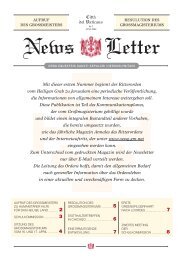
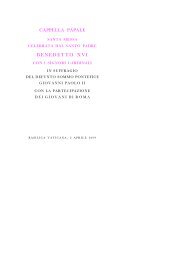
![AAS 01 [1909] - La Santa Sede](https://img.yumpu.com/51456523/1/180x260/aas-01-1909-la-santa-sede.jpg?quality=85)
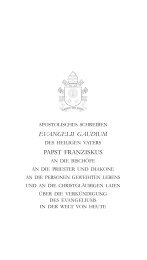
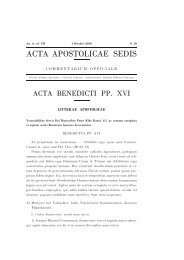
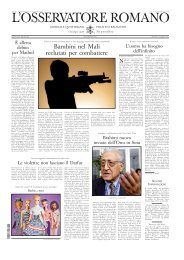
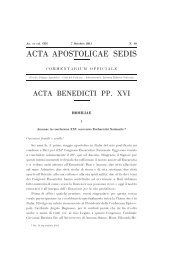
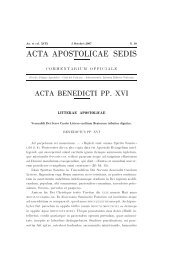
![AAS 20 [1928] - La Santa Sede](https://img.yumpu.com/19772818/1/180x260/aas-20-1928-la-santa-sede.jpg?quality=85)
